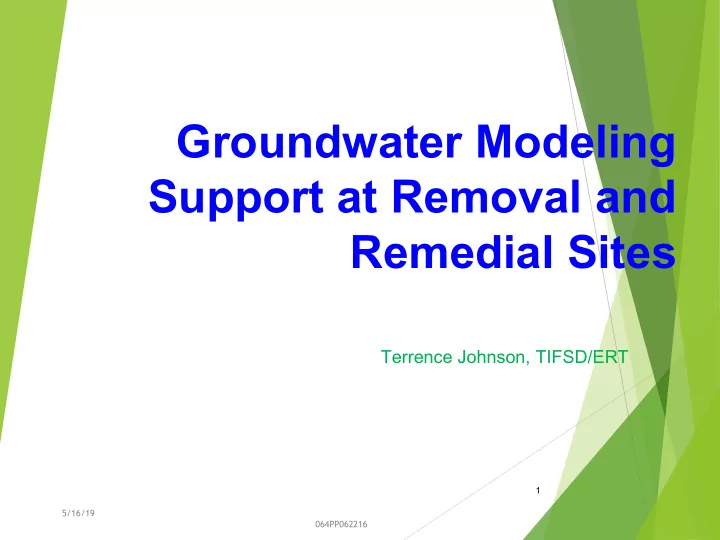

Groundwater Modeling Support at Removal and Remedial Sites Terrence Johnson, TIFSD/ERT 1 5/16/19 064PP062216
Modeling Support Model Review: PRP Consultant; and EPA Contractor. CSM Development and Model; and Implementation. 237PP041207 5/16/19 2
General Issues with PRP Models Proprietary, not widely used codes; Code and Model Assumptions: Strong PRP bias; Modeling process not fully transparent; and In adequate modeling process documentation. 5/20/201 237PP041207 3 9
General Issues with EPA Models Inexperienced Modelers; Modeling process not fully transparent; and In adequate modeling process documentation. 5/20/201 237PP041207 4 9
Modeling Support: Groundwater Modeling Site dependent with clearly defined objective; Generally 3D Groundwater Flow and Transport; and Will summarize with one model applications. 237PP041207 5/16/19 5
Generalized Modeling Flow Chart Modeling Objectives Build & Transport Model Data Collection Calibrate Develop Transport Model Conceptual Site Model YES YES Build Groundwater Flow Model Perform Simulations of Select Remedies and NO Evaluate Results Calibrate Flow Model NO
Modeling Groundwater Flow and Contaminant Transport at the Billings PCE Site
Background Data Elevated PCE vapors discovered indoors in a residential neighborhood in the City of Billings; Subsequent investigation identified an up to 1,000-ft wide by 10,000-ft long PCE plume in the underlying, shallow unconfined aquifer; Dissolved PCE concentrations range up to 33,100 ug/L. The likely source is vadose zone PCE DNAPL from the Big Sky Linen Dry Cleaners; and Site History indicates the plume is 30 to 40 years old.
Dissolved PCE Plume
PCE Plume Cross Section
Modeling Objectives Implement the CSM to improve the understanding of site conditions and identify data gaps; Evaluate plume stability (i.e., is the plume at steady state or getting larger/smaller); and Evaluate various remedial options.
PCE Plume August 2007 and Surface Drainage Model Rimrock Plateau North Draw Big Sky Linen South Draw 5-foot Surface Contour Intervals
Conceptual Site Model A CSM of the Billings basin watershed (80 sq. mi.) was developed; The 1/3 sq. mi. Site is within the watershed; Surface recharge to the aquifer is primarily from direct rainfall: average rainfall is 13 in/yr, and Recharge is greater in undeveloped areas opposed to urban (developed) areas;
CSM (cont’d) Regional Surface Water Hydrology The Yellowstone River (YSR) is the primary hydrogeologic feature within the watershed: drains the watershed and defines the southern boundary of the flow model, daily flow rates range from 3 to 27 billion cu. ft/day;
CSM (cont’d) Regional Physiography: site is surrounded by topographic highs that define the natural hydrogeologic boundaries of the watershed; Relief: elevations in the Billings basin range from 3,080 to 3,850 feet above msl with a regional slope to the east; Regional Geology: unconsolidated alluvium overlies massive bedrock. 5/20/201 15 9 SERAS-078-PP-022317
Model Construction The CSM is used to construct site specific numerical models using 3D software : MODFLOW: groundwater flow; and MT3D: contaminant transport.
Flow Model Assumptions Groundwater system is unconfined; Recharge is constant; Groundwater flow is steady-state; Hydraulic conductivity field is heterogeneous, isotropic horizontally and anisotropic vertically; and YSR defined as a constant head boundary (i.e., complete hydraulic connectivity with saturated zone). 5/20/201 17 9 SERAS-078-PP-022317
Flow Model Inputs Ground topography; Watershed boundaries; Geologic unit hydraulic conductivities; Surface hydrologic features: Drainage network Surface recharge.
Model Topography and Drainages
Bedrock surface 5/20/2019 20 237PP041207
Region onal G l Geolog ogy 5/20/2019 21 237PP041207
Fluvial Gravel Thickness 5/20/2019 22 237PP041207
Su Surfac ace Bo e Boundar ary Co Conditions 5/20/2019 23 237PP041207
Flow Model Calibration Builds model credibility (reality based); Model calibrated to groundwater elevation data collected on; 9/26/2006 Calibration criteria: normalized RMS <10% and correlation coefficient greater than 90%; and Calibrated Model: normalized RMS 1.4%; and correlation coefficient 99%.
Flo low Mo Model el Calib Calibration R Res esult lt 43 5/20/2019 25 SERAS-078-PP-022317
Obj. #1: CSM and Data Gaps CSM Model indicated high groundwater velocity (3 to 10 ft/day); and North and South draw directions plume migration subparallel to YSR. Data Gaps More site representative hydraulic conductivity data needed: Conducted additional aquifer testing; and Identified areas near the site where better hydraulic control was needed: Installed additional wells.
Transport Model Calibration Compare model predicted concentrations after 35 years to current dissolved concentrations; and Calibrated Model: Normalized RMS of 3.4%, and correlation coefficient of 99%.
Tra ransport Mo Model C Calibra ration R Result 5/20/2019 28 SERAS-078-PP-022317
Calibrated and Observed PCE Plume at 35 yrs 5/20/2019 29 SERAS-078-PP-022317
Obj. #2: Plume Stability Evaluation Plume is at quasi steady state; i.e., not growing; and No additional receptors threatened.
Obj. #3: Evaluation of Removal Options Options Simulated: source containment (sheet pile wall); source reduction (excavation); groundwater pump and treat; Reactive permeable barriers (PRB).
Obj. #3: Removal Action Source containment (sheet piling), ISCO and source removal on Central Ave; and ISCO and source removal in alley.
Post Removal Evaluation; Billings PCE Site Billings, MT 02/10/15
2008 PLUME 20
2014 PLUME UME 2
West 7 th th St Street W
1, 1,030 30 ft ft Downg ngradeint nt
ient 3,65 650 0 ft ft Downgrad adie
Recommend
More recommend